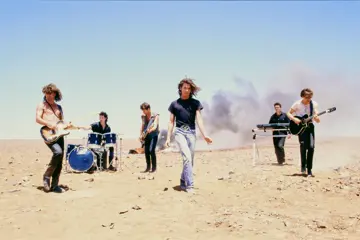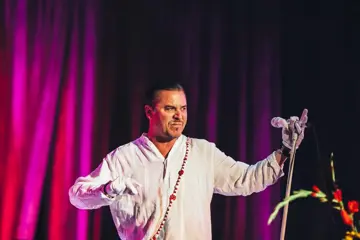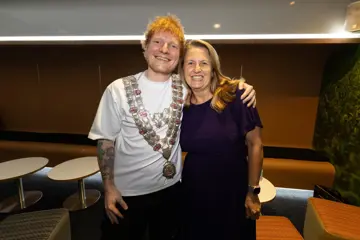Jet’s induction into the ARIA Hall of Fame shines a light on the Hall’s glaring inequity. Since it started in 1988, ARIA has inducted 81 acts; just 12 of them are female artists – 10 solo artists and two bands fronted by women (The Seekers and Divinyls).
ARIA hasn’t inducted a woman for five years - since Kasey Chambers in 2018.
There are some obvious contenders, including Kate Ceberano, Deborah Conway, Colleen Hewett, Jeannie Lewis, Jenny Morris, Wendy Matthews, Sharon O’Neill, Vika & Linda, Natalie Imbruglia, Christine Anu, Delta Goodrem, Missy Higgins and Sia, as well as several bands fronted by women: Tiddas, Baby Animals, Frente, The Superjesus, Eurogliders and Killing Heidi.
And then there’s Margret RoadKnight.
“Margret RoadKnight should be in the ARIA Hall of Fame,” says radio legend Billy Pinnell, who actually went to primary school with Margret at St John’s in East Melbourne. “She’s a commanding figure, a special person and a great artist. But for some reason, she’s underappreciated and hasn’t got the recognition she deserved.”
On her new compilation, Long Time… Recorded 1988-2023, the Melbourne singer jokes about how her career didn’t scale any stratospheric chart heights. In the introduction to her cover of Loudon Wainwright III’s How Old Are You?, RoadKnight notes: “You are supposed to struggle for a while and then have a minor hit. Well, I got that far, and then I failed. And after your minor hit, you’re supposed to have a major hit and then [a] smash hit after smash hit. And then, if you fail along that path, you are supposed to at least have the decency to go crazy.”
Yep, RoadKnight had just one chart hit: 1976’s Girls In Our Town, which hit #21 on the Melbourne charts.
Don't miss a beat with our FREE daily newsletter
But if you’re wondering why RoadKnight should be in the Hall of Fame, all you have to do is listen to Long Time. It’s all there. Margret RoadKnight is a masterful storyteller, even though she wrote none of the songs.
She says she didn’t become a songwriter “because the world doesn’t need more B-grade songs”.
“I curate, not create,” RoadKnight explains. Her career has been a never-ending search for songs she can shape and put her own stamp on “without trying too hard to come up with a totally different arrangement just to be different”.
RoadKnight’s body of work is eclectic and eccentric. And she’s never been a big fan of choruses. “Why repeat and repeat and repeat?” she asks. “Life’s too short – there’s another great song waiting in the wings.”
RoadKnight has covered some Aussie classics over the years, including Ross Wilson’s Living In The Land Of Oz, Doug Ashdown’s Winter In America and Spectrum’s I’ll Be Gone. And she says she does “the world’s second-best version” of John Lennon’s Imagine.
RoadKnight is a giant of the folk world, both literally (she’s 6 foot 4) and figuratively. The National Folk Festival presented her with a Lifetime Achievement Award in 2014. Four years later, RoadKnight was recognised with a Lifetime Achievement Award at the inaugural Australian Women in Music Awards, alongside Renée Geyer and Little Pattie. The AWMA founder Vicki Gordon said: “Women have always done extraordinary work – it’s just that many women have not been recognised for their contribution.”
RoadKnight hates labels but doesn’t mind being called a feminist singer. “Anyone with at least half a brain would be happy to be called a feminist. It’s all about equality.”
Asked if it’s been difficult being a woman in the music industry, RoadKnight replies, “You’re asking the wrong person – I’ve had more problems with genre than gender.” In an industry that loves to pigeonhole people, the genre-busting RoadKnight has sung folk, blues, jazz, gospel, cabaret and comedy.
“If I wrote songs, they’d be able to say, ‘Singer-songwriter Margret RoadKnight’, but I’m just a singer, so people ask, ‘What sort of singer are you?’ I say, ‘I’m a singer of interesting songs that you don’t know.’”
RoadKnight reveals that Girls In Our Town was an accidental hit. The record company wanted her to release a single – a cover of Billy Joel’s Captain Jack, the closing track on Joel’s breakthrough album, Piano Man. The singer wasn’t so keen. She didn’t have a problem with the lyric and its references to drug use, death and masturbation, but she was concerned by the track’s length – more than seven minutes – and its complex instrumentation, which didn’t suit her straightforward live show. But RoadKnight agreed to cut the song as long as she could select the B-side.
Dave Graney says Girls In Our Town is “something like The Smiths would do a decade later – the bleakness of life brings out a blues that’s kind of electrifying. It’s incredible.”
Girls In Our Town was added to the “Sounds of Australia”, the National Film & Sound Archive’s selection of sounds that have “cultural, historical and aesthetic significance and relevance, which inform or reflect life in Australia”.
The song was initially shunned by radio – 2JJ wouldn’t play it because the song’s writer, Bob Hudson, worked at the station, while 2SM, then owned by the Catholic Church, wouldn’t touch it because it mentioned the pill. But it took off when Melbourne DJ Stan “The Man” Rofe started playing it on 3XY.
After Girls In Our Town became a hit, Festival Records signed RoadKnight directly to the label. The company would later tell her: “Now, Margaret, of all our acts, nobody gets more reviews than you do. And nobody gets a higher percentage of rave reviews. And nobody sells fewer albums.”
But Girls In Our Town helped give RoadKnight an enduring career. She sent Hudson a copy of her new compilation, inscribed: “Without whose song …”
Long Time features a new guitar-based version of Girls In Our Town, complete with an ensemble of 50 recorder players.
Long Time is a timely release. It’s 60 years since RoadKnight’s first professional gig and 50 years since her debut album. And she recently turned 80.
RoadKnight’s first gig was at South Melbourne’s Emerald Hill Theatre, where she was booked by the trailblazing Glen Tomasetti on Mother’s Day 1963. She sang four songs, including Sometimes I Feel Like A Motherless Child, which was awkward because her mother was in the audience. “I was very insensitive when I was 19.”
RoadKnight was a contemporary of Judith Durham, even replacing Durham in Frank Traynor’s Jazz Preachers when Durham joined The Seekers.
RoadKnight’s debut album, People Get Ready, came 10 years after her first gig. “Nowadays, 10 minutes later, people are in their bedrooms making albums and uploading it to the digital world,” she laughs. “But I made albums just to get people to come to my gigs.”
Though she did gigs for Women’s Liberation and Nuclear Disarmament, as well as at Vietnam moratorium marches, RoadKnight plays down her activism, joking that initially, she would have been one of the only “right-wing folk singers” in the world. Coming from an Irish Catholic family, the first party she voted for was the DLP – the anti-Communist party that formed after the great split in the Labor Party in 1955.
But the music changed RoadKnight, and she became politically engaged. “Adults can change,” she notes.
An Australia Council grant enabled RoadKnight to tour the US for the first time in 1974, and she spent a lot of time in America. “I was tempted to try to establish myself there, but they just don’t get our humour.”
In the US, RoadKnight became friends with her favourite songwriter, Malvina Reynolds, who wrote Pete Seeger’s Little Boxes and The Seekers’ Morningtown Ride. The American artist was dubbed “the grandmother of folk music”, a label she didn’t particularly dig. In response, she said: “You can call us ‘long time people’ because we’ve been here a long time, and we know a lot.”
That description helped inspire the title of RoadKnight’s new compilation, which features a version of Reynolds’ My Little Guitar (with one of her little guitars featured on the cover).
Jen Cloher – who was also an inaugural AWMA winner for Music Leadership – highlighted RoadKnight’s work in a speech at the Darebin Music Feast in Melbourne. “Thank God for Patti Smith, Margret RoadKnight, Björk, Anohni, Peaches, Aretha Franklin, Yoko Ono, Nina Simone, Ruby Hunter – the list goes on and on – for showing me that the voice of older artists will always be relevant. There is a wisdom I need to hear in their work, a life fully lived and examined.”
Long Time is released by Melbourne’s Chapter Music, which won Independent Label of the Year at this year’s AIR Awards. Dave Graney says it’s “a fantastic meeting of generations”.
Chapter has compiled a 16-minute documentary to promote the album.
Long Time gathers tracks from RoadKnight’s last three albums, with two bonus tracks. She believes it might be her final album, but she’s not “retiring”.
“If Hollywood calls, I’ll be getting my muscular voice back into training,” she smiles.
RoadKnight’s career has been quite the trip. She’s even been mentioned in parliament. Queensland Labor Senator Claire Moore made a passionate speech to the Senate in 2008, praising RoadKnight’s social activism. “RoadKnight has the gift of engaging and teaching all of us to use our voices,” Senator Moore said, “because she is committed to see that the world can sing.”
You sense that RoadKnight appreciates the accolades, but she obviously didn’t get into this business for awards or chart hits. The singing has been its own reward, with gigs around the world, from Melbourne coffee houses to America, Europe, West Africa and China.
RoadKnight’s email signature comes with the kicker: “When you’re happy – sing! When you’re sad – sing louder!”
It seems like good advice.
Margret RoadKnight is launching Long Time at the Wheeler Centre in Melbourne on November 29.















